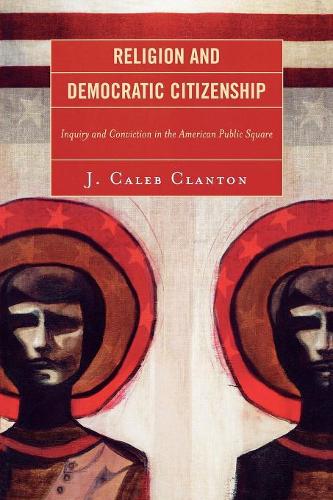
Religion and Democratic Citizenship: Inquiry and Conviction in the American Public Square
(Paperback)
Publishing Details
Religion and Democratic Citizenship: Inquiry and Conviction in the American Public Square
By (Author) Caleb J. Clanton
Bloomsbury Publishing PLC
Lexington Books
6th November 2007
United States
Classifications
Professional and Scholarly
Non Fiction
322.10973
Physical Properties
Paperback
172
Width 153mm, Height 236mm, Spine 15mm
263g
Description
Polls indicate that many, if not most, Americans think that their religion should play some sort of role in the political arena. But are they misguided When citizens allow their religious convictions to filter into the political sphere, are they acting as bad citizens In a pluralistic democracy such as ours, what is the proper relationship between religion and politics Religion and Democratic Citizenship critically examines a variety of proposals to address the question of whether and how religion should influence the activities of the American public square, from public deliberation to voting. These proposals commonly fall into two broad types of familiar strategies. On the one hand, mainstream liberal political theorists like John Rawls and others seek to keep religion and politics largely separate. On the other hand, pragmatists like William James, John Dewey, and Cornel West seek to reinterpret the meaning of religion itself so that it can be rendered compatible with democracy. Religion and Democratic Citizenship outlines the shortcomings of both of these strategies and aims to reframe the nature of the debate concerning the proper relationship between religion and politics by offering a useful framework for further discussion. Drawing influence from both Socrates and C. S. Peirce, the author proposes a model of the deliberative democracy designed to accommodate as many democratically predisposed citizens as possible, whether they are religious or not. In so doing, this book ultimately offers a strategy to accommodate religious participation in the activities of the democratic public square a strategy that enables citizens to employ religious reasoning and meet the epistemic obligations of good deliberative democratic citizenship. Readers of this book will include researchers interested in Philosophy, Political Science, Law, Sociology, and Theology, as well as teachers, students, politicians, clergy, and concerned citizens.
Reviews
Clanton has provided us with very nice arguments against liberalism's attempt at keeping public reason neutral and for allowing (fallible) religious beliefs into the sphere of public deliberation. His anti-Rawlsian view draws on the pragmatist tradition, developing a view of public inquiry on which we aim at getting things right and hence must be committed to exchanging reasons. The book will be of real interest to both those working in political theory and in American pragmatism. -- Cheryl Misak, University of Toronto
Author Bio
J. Caleb Clanton is assistant professor of philosophy at Pepperdine University.
